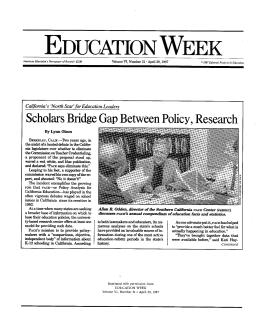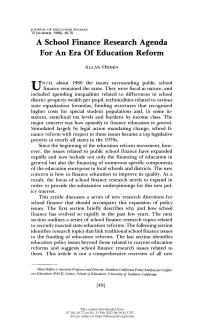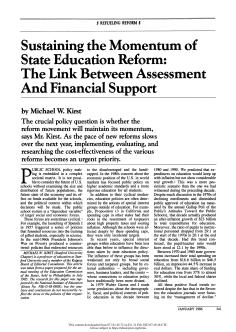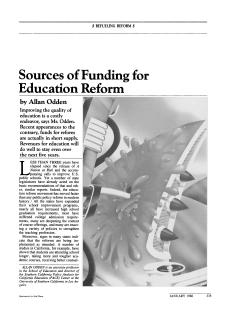Published
Summary
PACE, a university-based research center, provides "nonpartisan, objective, independent" information on K-12 schooling in CA. Its analyses have been invaluable to lawmakers and educators during the state's active education-reform period. PACE has played a growing role in debates on school issues, exemplified by a heated debate in the CA legislature over the Commission on Teacher Credentialing. PACE offers a model for providing data for education policies when many states are seeking broader information bases. It has helped provide a better understanding of what is happening in education.
Published
Summary
Before the 1970s, public school finance issues were mainly related to spending inequalities. However, since then, the focus has shifted towards financing education to improve its quality. This article suggests new research directions for school finance that address this policy interest, including topics related to state education reforms, traditional school finance issues, and education policy issues beyond current reforms.
The Link Between Assessment and Financial Support
Published
Summary
Public school policy making is embedded in a complex societal matrix. It is not possible to consider the future of U.S. schools without examining the size and distribution of future populations; the future state of the economy and its effect on funds available for the schools; and the political context within which decisions will be made. The public school system is a "dependent variable" of larger social and economic forces.
Published
Summary
Several state legislatures have acted on recommendations to improve U.S. public schools, resulting in a swift and broad education reform movement. States have expanded school improvement programs, increased high school graduation and college admission requirements, deepened course offerings, and strengthened the teaching profession. Indicators of progress include longer school attendance, tougher academic courses, better counseling, higher achievement test scores, and increased teacher pay. This swift and broad movement gives reason for optimism about its success.



